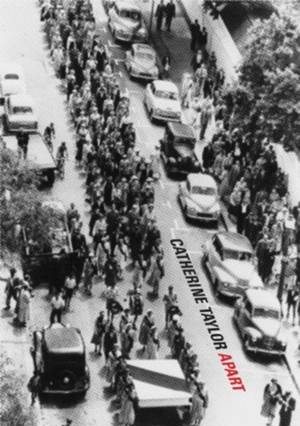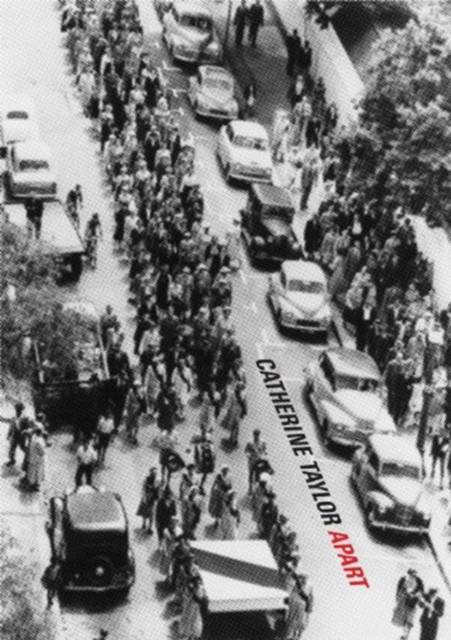
- Retrait gratuit dans votre magasin Club
- 7.000.000 titres dans notre catalogue
- Payer en toute sécurité
- Toujours un magasin près de chez vous
- Retrait gratuit dans votre magasin Club
- 7.000.0000 titres dans notre catalogue
- Payer en toute sécurité
- Toujours un magasin près de chez vous
Description
Literary Nonfiction. APART grew out of Taylor's memories of visiting her family in South Africa as a child and her later curiosity about her (white) mother's involvement in early anti-apartheid women's groups. Mixing narrative prose, poems, social and political theory, and found texts culled from years of visiting South African archives and libraries, APART navigates the difficult landscapes of history, shame, privilege, and grief.
"Catherine Taylor's APART offers an intimate and sweeping look at the legacy of apartheid, while performing an altogether rare balance of 'lyric seduction' against 'the ugliness of corpses.' Taylor refreshingly treats white guilt and the self-conscious recognition of privilege as starting points rather than conclusions, as she plumbs the depths of history, from which, as she reminds us, 'no one is excused.' The result is edifying, original, and critically rigorous--a poetic and political vibration between 'ecstasy, shame, ecstasy, shame.'"--Maggie Nelson
"Catherine Taylor's APART is neither journalism nor memoir nor documentary poem nor lyric essay nor jeremiad--though it contains elements of them all--but a brilliant and relentless examination of conscience always in search of a literary form adequate to its mission. Embarked on the 'search for a common name' in the aftermath of South African Apartheid, Taylor's takes care on her way to gather an archive of feelings, 'signs of struggle, boredom, hope, effort, fatigue, tedium, privilege, its lack, brutality, tyranny, complicity, despair, and resistance.' If APART renders in language the affect of having an ethics, what makes Taylor's writing ultimately so persuasive as a politics is its portrait of the private citizen as 'at once ineffectual and humane, complicit and resistant, irrelevant and necessary.' Deeply attentive to the contradictory ideologies that structure our lives as historical subjects, Taylor's vision of conscientious citizenship demands that we recognize subjectivity's intrinsic subjection to power without ever losing sight of our individual agency and the necessity for independent action and inquiry. Thinking its way through the insidious, tragic inequalities of globalization, capitalism, and democracy's alleged freedoms, APART indeed succeeds in persuading its readers to disavow 'a cynicism we can't afford.'"--Brian Teare
"Catherine Taylor's APART offers an intimate and sweeping look at the legacy of apartheid, while performing an altogether rare balance of 'lyric seduction' against 'the ugliness of corpses.' Taylor refreshingly treats white guilt and the self-conscious recognition of privilege as starting points rather than conclusions, as she plumbs the depths of history, from which, as she reminds us, 'no one is excused.' The result is edifying, original, and critically rigorous--a poetic and political vibration between 'ecstasy, shame, ecstasy, shame.'"--Maggie Nelson
"Catherine Taylor's APART is neither journalism nor memoir nor documentary poem nor lyric essay nor jeremiad--though it contains elements of them all--but a brilliant and relentless examination of conscience always in search of a literary form adequate to its mission. Embarked on the 'search for a common name' in the aftermath of South African Apartheid, Taylor's takes care on her way to gather an archive of feelings, 'signs of struggle, boredom, hope, effort, fatigue, tedium, privilege, its lack, brutality, tyranny, complicity, despair, and resistance.' If APART renders in language the affect of having an ethics, what makes Taylor's writing ultimately so persuasive as a politics is its portrait of the private citizen as 'at once ineffectual and humane, complicit and resistant, irrelevant and necessary.' Deeply attentive to the contradictory ideologies that structure our lives as historical subjects, Taylor's vision of conscientious citizenship demands that we recognize subjectivity's intrinsic subjection to power without ever losing sight of our individual agency and the necessity for independent action and inquiry. Thinking its way through the insidious, tragic inequalities of globalization, capitalism, and democracy's alleged freedoms, APART indeed succeeds in persuading its readers to disavow 'a cynicism we can't afford.'"--Brian Teare
Spécifications
Parties prenantes
- Auteur(s) :
- Editeur:
Contenu
- Nombre de pages :
- 168
- Langue:
- Anglais
- Collection :
Caractéristiques
- EAN:
- 9781933254968
- Date de parution :
- 08-05-12
- Format:
- Livre broché
- Format numérique:
- Trade paperback (VS)
- Dimensions :
- 150 mm x 211 mm
- Poids :
- 235 g

Les avis
Nous publions uniquement les avis qui respectent les conditions requises. Consultez nos conditions pour les avis.






